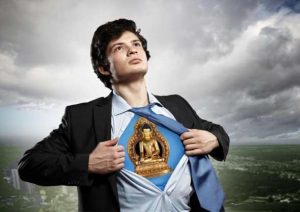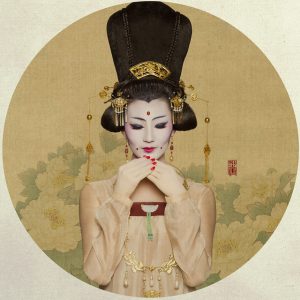
Monks at Dharmarajika, a Buddhist monastery in the Bangladeshi capital Dhaka, are this month upholding a tradition that began more than a decade ago in 2013 of providing iftar meals to underprivileged Muslims during Ramadan.
Venerable Suddhananda Mahathero (1933–2020), a former abbot of the monastery and former supreme patriarch of the Bangladesh Bauddha Bhikkhu Mahasabha (the Supreme Sangha Council of Bangladesh), began the project as a way to show civic responsibility and generosity toward the local Muslim community, who have supported Dharmarajika since its founding in 1951.
Ever since the iftar initiative was introduced, the monks have distributed meal boxes to numerous underprivileged Muslims during Ramadan. Starting from 5.30 p.m., people line up in the afternoon eagerly awaiting the food, which includes a variety of dishes, such as beguni (eggplant tempura), chhola-boot (lentils), khejur (dates), muri (puffed rice), potato chips, peyaju (onion tempura), and jilapi (a sweet made with sugar syrup).
During the month-long religious festival of Ramadan, Muslims break their daily fast at sunset in a tradition that commemorates the first revelation of the Quran to Muhammad. Ramadan typically occurs during the ninth month of the Islamic calendar. This year, Ramadan started on 11 March and will conclude on the evening of 10 May with Eid-ul-Fitr, the festival that marks the end of the fast.
The media has praised the iftar initiative at Dharmarajika as a symbol of social harmony between religious communities in a country plagued by religious intolerance and violence against minorities.
Blogger Mahasan Sopno, who launched the Mojar TV Facebook channel, posted a video showcasing the distribution of iftar meals, depicting individuals from various socio-economic backgrounds congregating at the main entrance of Dharmarajika. Many of those gathered are from low-income households, including impoverished women in need of a meal.
The monastery provides iftar for more than 100 individuals daily, with additional iftar purchased as needed. As the afternoon progresses, the crowd waiting for iftar grows. Each person receives a card and patiently waits in line outside the main gate for their meal. Then the Buddhist monks distribute food packs to cardholders and, despite religious differences, the Muslim community graciously accepts the gift.
Brahmanda Pratap Baura, president of the Bangladesh Bauddha Kristi Prachara Sangha youth organization, noted that during Ramadan, the monks were connected by a bond of harmony with their Muslim brothers and sisters through the iftar distribution program.
Ven. Buddhananda Mahathero, abbot of Dharmarajika and president of the Bangladesh Bauddha Kristi Prachar Sangha, actively participates in serving boxed iftar meals daily as part of this compassionate gesture.
Ven. Buddhananda mentioned that since 2013, with the exception of two years during the COVID-19 pandemic, the monks had carried out this program to promote a united Bangladesh and to support the well-being of the impoverished local community during the holy month of Ramadan.

People who have received iftar meals express gratitude for being able to have a satisfying meal during Ramadan, and offer thanks for the organization’s efforts.
In addition to distributing iftar boxes, the monks are engaged in various social-welfare initiatives, such as providing fresh water to approximately 300 individuals daily. The monastery also serves as a home to more than 700 orphans, who receive free education at a school on the premises.
See more
মানবতার কল্যাণে এক দশক ধরে ঢাকার ধর্মরাজিক বৌদ্ধ মহাবিহার থেকে ধর্মপ্রাণ ও দুঃস্থ মুসলিম রোজাদারদের মাঝে বিতরণ করা হয় ইফতারের সামগ্রী (Atish Dipankar Facebook)
Related news reports from BDG
Buddhist Monks in Bangladesh Offer Iftar to Needy Muslims During Ramadan
Bangladesh’s Foremost Buddhist Leader Suddhananda Mahathero Dies Aged 87
Interfaith Harmony: Singaporean Buddhists and Hindus Donate Rice to Muslims for Ramadan
Dalai Lama Shares a Message of Interfaith Harmony with Ladakh’s Muslim Community
Related features from BDG
My Personal Experience with Ramadan
A Buddhist Approach to Interreligious Conflict and Harmony
Buddhists can learn from the example of Turkish hospitality
The Untapped Diplomatic Potential of Bangladesh’s Buddhist Heritage














